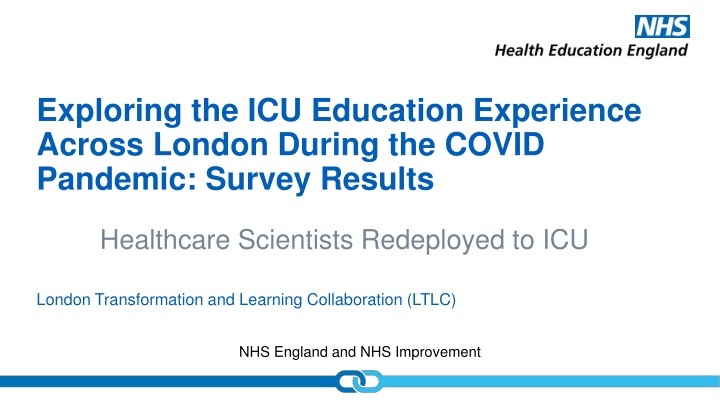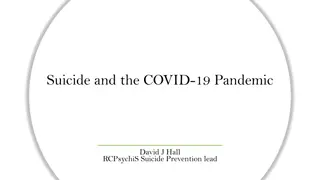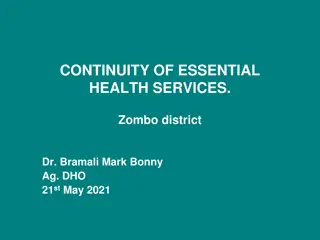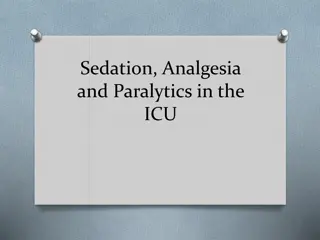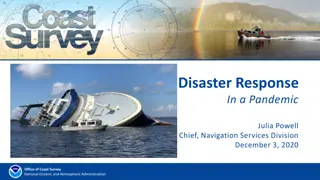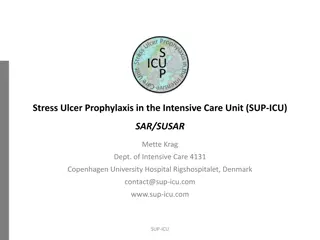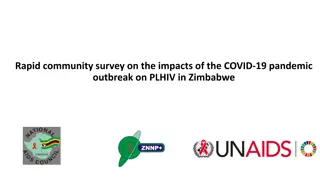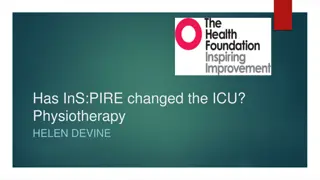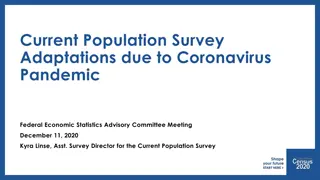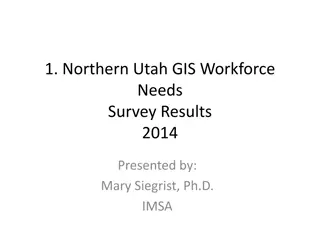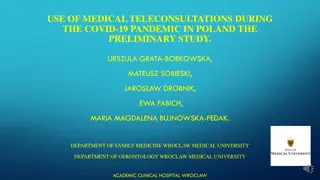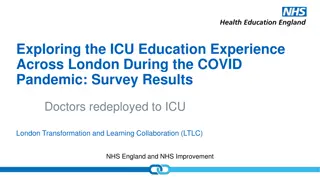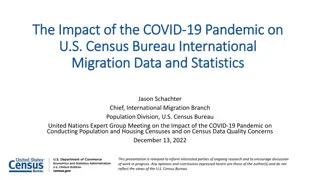ICU Education Experience Across London During COVID Pandemic Survey Results
Explore the outcomes of the London Transformation & Learning Collaborative (LTLC) program focusing on enhancing critical care staffing and education in response to the COVID-19 pandemic. The initiative aims to cross-skill staff, expand ICU capacity, and optimize workforce capabilities to manage current and potential future demands efficiently. Survey results reflect perspectives from healthcare professionals who worked in ICUs across London, highlighting training experiences, challenges, success factors, and recommendations for colleague support. The LTLC program strives to improve patient outcomes, support staff preparedness, and foster collaboration among healthcare organizations.
Download Presentation

Please find below an Image/Link to download the presentation.
The content on the website is provided AS IS for your information and personal use only. It may not be sold, licensed, or shared on other websites without obtaining consent from the author.If you encounter any issues during the download, it is possible that the publisher has removed the file from their server.
You are allowed to download the files provided on this website for personal or commercial use, subject to the condition that they are used lawfully. All files are the property of their respective owners.
The content on the website is provided AS IS for your information and personal use only. It may not be sold, licensed, or shared on other websites without obtaining consent from the author.
E N D
Presentation Transcript
Exploring the ICU Education Experience Across London During the COVID Pandemic: Survey Results Healthcare Scientists Redeployed to ICU London Transformation and Learning Collaboration (LTLC) NHS England and NHS Improvement
Purpose of the London Transformation & Learning Collaborative (LTLC) We want to assist system working and move forward in a way that will support growth and optimise effectiveness. Work collaboratively Share best practice across organisations, systems and the region Enable colleagues to be more prepared to work in an expanded critical care as well as in the event of a second surge thereby improving staff experience Support each other in improving patient outcomes Providing training content and structure that can be delivered consistently and effectively | 2
About the LTLC Programme: Purpose To increase the supply and resilience of staffing for critical care across London To develop a London plan that seeks to ensure that the NHS workforce is equipped with the skills and capabilities to manage existing demand, potential future spikes in demand as a result of Covid-19 and longer-term permanent expansion of critical care capacity in London. Primary outcome To cross-skill staff to support the London region to expand ICU capacity with the potential to open more critical care beds in surge Scope Develop clinical education transformation capability across the NHS in London: Develop transformation programmes which align to patient need, service model, and workforce models. Co-ordinate design and delivery of training to support London s response to Covid-19: Establish innovative education delivery models that will support the development of an agile workforce that has the robust capability to deal with a second surge. | 3
Survey Aims and Research Questions Aim: Explore education experiences of those who worked in ICUs across London during the COVID pandemic; both those who worked in ICU and those who were redeployed to ICU Research Questions: 1 2 3 ICU staff receiving education Demographics Useful elements of training Elements of preparation that were missing What would you do differently? ICU staff delivering education Non-ICU/Redeployed staff Useful elements of training Training that was missing Useful things learnt (how and from who) Steepest learning curve (how it was overcome) Training resources used What would you do differently? Advice to a colleague going to work in ICU Demographics Education successes Education challenges Useful professional groups Support needed for a second surge Would collaborating with other ICUs help? Training resources and IT systems used 179 responses 138 responses 616 responses | 4 Total = 933 responses
Survey Results: Reponses from Healthcare Scientists that were redeployed to ICU during the pandemic Total = 14 Responses *Resources that were suggested in the survey responses are being collated separately and are not discussed in this summary | 5
Redeployed Healthcare Scientists: Area and Location Normal Area of Work No. 1 1 1 1 1 1 1 1 3 1 1 1 14 Response Rates by Area of London Banding No. Auditory Implants Gastroenterology Cardiology Outpatients Radiology Radiation Safety Urology Physiological Measurement Gait laboratory Clinical Engineering Medical physics Biomechanics TOTAL Band 6 7 Band 7 6 Band 8 1 SOUTH WEST NORTH CENTRAL TOTAL 14 SOUTH EAST | 6
Q1: During the initial COVID response what was the most useful and important elements of training you received? Responses Equipment training generally Specific simulation/training course 6 6 Ventilation/ventilators 4 PPE and infection control Anatomy/physiology 1 1 ABG (taking and analysing) 1 Shadowing in ICU 1 | 7
Discussion Q1: During the initial COVID response what was the most useful and important elements of training you received? The healthcare scientist responses mainly related to equipment training with ventilators being commonly discussed Many health care scientists specifically mentioned the SIMV (Southwest Intensive Care Mechanical Ventilation) course as being useful Hands- on training within ICU was commonly cited as being the most useful part of training Learning how to carryout quality assurance on the machines, how the machine operate, and what equipment is used for clinically Redeployed healthcare scientist | 8
Q2: What do you wish you had known more about / had more specific training before you worked in CC? Responses Role definitions 5 Equipment knowledge 5 Better training generally Hands-on training 1 1 ABGS 1 Proning Humans factors 1 1 Meeting the team 1 | 9
Discussion Q2: What do you wish you had known more about/ had more specific training before you worked in CC? Many healthcare scientists said they would like more information about the role that they and others were expected to do As someone who does not usually work in a CC setting, understanding the hierarchies and responsibilities of the different professionals ahead of going would have been beneficial Redeployed healthcare scientist Knowledge of equipment was commonly felt to be lacking - particularly around ventilators (knowledge on failures, faults and testing ventilators was mentioned) More familiarity with the equipment used... e.g. water traps and components to measure SpO2, humidifiers, non-invasive ventilation Redeployed healthcare scientist I wish I had known more about the equipment from the very beginning. As a physicist redeployed as a support engineer I did not have any knowledge about ventilators, monitors, pumps etc Redeployed healthcare scientist | 10
Q3. What were the most useful things you learnt whilst looking after patients in CC? Who did you learn this from and how? From Who and How Most useful things learnt on CC Colleagues generally Nurses Courses Healthcare scientists 4 3 2 1 Ventilation/ventilators 6 Equipment generally 4 Personal growth/skills 3 ICU generally 2 Doctors Machine representatives Supervision Biomedical scientists 1 1 1 1 PPE 1 Blood gas machines 1 ABGs (taking and analysis) 1 Proning 1 Patient experience 1 | 11
Discussion Q3: What were the most useful things you learnt whilst looking after patient in CC? Who did you learn this from and how? It was felt that most learning occurred within ICU as opposed to during training Knowledge around ventilators was felt to be the most useful thing learnt on ICU. Things discussed included set up, testing, faults and troubleshooting Colleagues were the greatest source on knowledge for redeployed healthcare scientists How to swap ventilators that are attached to patients, trouble shooting common issues with equipment, working with a wide range of other professionals in an usual environment. Also learned about the issues that are likely to crop up when a large group of people are working under these new unusual conditions Redeployed healthcare scientist The fundamentals of mechanical ventilation. I was able to apply that understanding to different problems that arose with the equipment Redeployed healthcare scientist | 12
Q4a: What were the steepest learning curves you faced on redeployment? How did you overcome them? Steepest Learning Curves How did you overcome them? New environment and role Coping with physical stress Team dynamics Equipment use 4 3 3 2 Colleagues Internet Courses Books/literature 10 3 2 2 Respiratory physiology Coping with psychological stress 1 1 Hands on experience Radio 1 1 | 13
DiscussionQ4: What were the steepest learning curves you faced on redeployment? How did you overcome them? The lack of knowledge about the new working environment and role was commonly mentioned actually the toughest thing to learn was how to work in the ICU environment effectively; to integrate and therefore appropriately support the ICU at a time when a large amount of people on the ward were learning too Redeployed healthcare scientist Coping with psychological and physical stress were steep learning curves for many. Physical stress included working night shifts Equipment use was a steep learning curve for some Learning about all of the new pieces of equipment and how they make up an intensive care unit Redeployed healthcare scientist Colleagues were crucial to managing the steep learning curves | 14
Q5: What would you do differently if you had to go back to your initial redeployment? Knowing the role expectations was commonly discussed as well as knowing other staff members' roles Responses No. Improve role definition/role allocation Know equipment better Improve clinical knowledge Ask for help/support/ask questions More self-directed learning Supernumerary time/shadowing Be more assertive/confident 3 1 1 1 1 1 1 Work our exactly what our role is prior to redeployment and what exactly we d be expected to do and not do Redeployed healthcare scientist Find out exactly where my expertise could help, and also make it known what my skills are to most people on the floor Redeployed healthcare scientist Other things mentioned were knowing the equipment prior to redeployment, having better knowledge prior to redeployment, asking for help and being more assertive | 15
Q6: What is the one piece of advice you would give a colleague going to work on CC? Having a positive attitude to the experience was a common piece of advice Responses No. Be positive Seek advice/help/support Talk to colleagues/others Prioritise self Care Remain calm Don t worry/pressurise yourself Know role expectations Be confident Know your limitations Learn equipment 3 2 2 2 2 2 2 1 1 1 Just do the best you can and keep a positive team spirit Redeployed healthcare scientist Many advised to seek help advice or support where needed Dont be afraid to ask for help and support Redeployed healthcare scientist | 16
Conclusions: The theme of equipment was the strongest theme discussed by healthcare scientists It was the most important element of training received Training on equipment was commonly lacking Ventilators were the commonest piece of equipment discussed; knowledge on failures, faults and testing ventilators was mentioned It was commonly mentioned that hands-on training and shadowing/supernumerary days within ICU prior to redeployment would have been useful Coping with psychological and physical stress were steep learning curves Many healthcare scientists said they would like more information about the role that they and others were expected to do. This theme was stronger for healthcare scientists than other staff groups | 17
The LTLC: Education Workstream The LTLC are using these survey results (as well as focus groups) to inform the following: Support role definition Share Education Content Create a Skills Passport Publish a skills matrix mapped to existing competency frameworks for all critical care roles Curate existing high quality education content into modules mapped to the skills matrix Create electronic competency passports, interfacing with IT systems, e-learning and face to face education This can be used locally to inform learning objectives and avoid over-teaching Specific areas include: Leadership training Teamworking Wellbeing ICU equipment Explore compatibility with e- rostering platforms | 18
